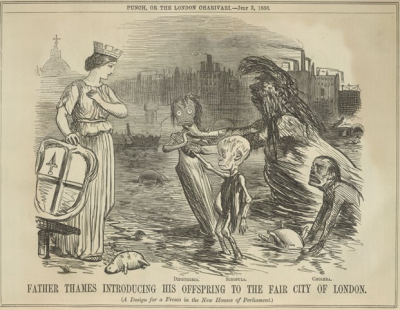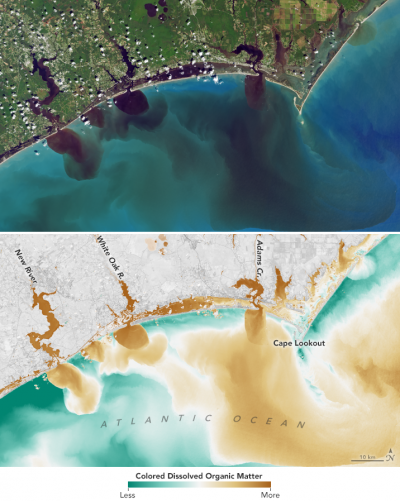10/2/2018 by Eleanor Goldfield
When the obvious solution becomes the only solution, real change will come.
Father Thames was a hot mess. From a glistening river god nestled by a small Roman fort, he had devolved into a putrid disease-carrying wretch, literally dripping with industrial runoff and human and animal waste. Of course, none of this was his fault. He, as so many other rivers and their deities was the unwilling recipient of an unconcerned human race’s refuse.
By the 1600s, London residents were already voicing concern over the pollution in their most famed river. Unfortunately, the matter was neither easily solved nor considered serious enough. So the public’s concerns went unheeded, and dumping continued. By the 1800s, thanks to unfettered dumping and industrialization, the Thames was the most polluted river in the world. In 1855, celebrated scientist Michael Faraday took a boat down the Thames to assess the levels of pollution. The conclusion in his letter to The Times Newspaper called “Observations on the Filth of the Thames” says it all, and rings familiar alarm bells as we stand at our own modern-day environmental precipice. “If we neglect this subject, we cannot expect to do so with impunity; nor ought we to be surprised if, ere many years are over, a hot season give us sad proof of the folly of our carelessness.” Three years later, in the summer of 1858, “The Great Stink” played out his prophetic words as if they were written into a Greek tragedy.
It was the hottest summer in memory; temperatures in the shade reached 94.5 degrees Fahrenheit. Water steamed and levels dropped revealing heaps of waste – 6 feet tall in some places – fermenting on the river banks in the blistering sun. Cholera outbreaks were raging and thanks to the prevailing misconception that “bad air” or miasma caused diseases to spread, cholera advanced unhindered. As people around the city drank from pumps fed with contaminated water, the horrifically ideal conditions for death were sewn, and cholera reaped indiscriminately. Interestingly enough, much like Faraday’s 1855 warning, physician Sir John Snow had written a paper in 1849 suggesting that cholera actually entered the body through the mouth, not through “bad air.” In 1854, he was able to put this theory to the test by removing a contaminated water pump from a particularly cholera-stricken neighborhood. Not surprisingly, once the people in that area no longer pulled shitty water from that pump, cases of cholera decreased dramatically and quickly. However, just as with Faraday’s warning, little attention was given to Snow’s findings. It wouldn’t be until after his death in the 1860s that miasma theory gave way to the scientifically accurate understanding of disease communication.
Meanwhile, as the Great Stink continued to rise, the powers that be were doing all they could to avoid the obvious solution. In their new houses of Parliament on the banks of the Thames, lawmakers first ordered the curtains doused in a mixture of chloride and lime (industrial-strength bleach). All that did was add a sickly chemical scent to the oppressive stench. Another hugely impractical idea was to simply move the entire government from the Westminster area despite the fact that they had only recently moved into the new buildings. However, as it became clearer that both rich and poor were susceptible to not only cholera but to the debilitating stench, the obvious solution eventually gained traction. In one of the quickest turnovers in history, a bill was rushed through in 18 days to fund the construction of a massive new sewer system as well as to build the Embankment along the Thames in order to improve the flow of water and of traffic.
Great. So what? What does this stinky bit of history have to do with me, in this time and place? Well, human folly can’t help but run in circles. And as the saying goes, “those who do not learn from history are doomed to repeat it.” Looking back 160 years after the fact, I can’t help but sigh and groan at the predictability of a selfish avarice: systems built on pride in industry, pride in imperialist reach, pride in profit – combined with lazy habit, a disdain and disregard for expert and scientific evidence, a disregard for public health until it reaches a level that affects the wealthy, and an avoidance of obvious and necessary change in order to save money in the short term and protect the status quo.
Let’s look at what’s happening right now in North Carolina as an example. The National Weather Service claimed Hurricane Florence’s catastrophic rainfall represented a 1000-year rain event with less than 0.1% probability. As per usual, they didn’t mention climate change – or the fact that these “rain events” are now more common, so calling it a once-in-1000-year event with less than 0.1% probability is dangerously misleading. Folks alive today will see several more of these events before they hit the ripe old age of 1,000. Still, what kind of Christian nation would we be were it not for our enthusiastic disdain for science – and its warnings? Unfortunately, as was the case in 1850s London, ignoring science doesn’t make a shit bit of difference to science. And scientifically (read: realistically) speaking, climate change not only fueled Hurricane Florence’s intense rainfall, but in so doing pummeled some of the very sources of that climate change. Hog lagoons, aka football-field sized craters of hog shit, seeped into adjacent waterways. Close behind was coal ash. Coal ash is the waste product left after coal is burned and contains “a variety of heavy metals, including arsenic, lead, mercury and chromium.” Still Duke Energy wants you to know all is well and their toxic landfills pose no threat to public health. They also want you to know that despite the fact that cooling water from a power plant leaked into the Cape Fear River, there was “little to no impact” on river water quality. Right. This coming from the same company that intentionally dumped 61 million gallons of coal ash into a tributary of the very same Cape Fear River just 4 years ago. Incidentally, that was the eighth time in a month that Duke Energy was found to be violating pretty lax environmental regulations. So, forgive my skepticism, Duke, but I’m just not buying it.
And while profit-driven entities from Duke Energy to the North Carolina Pork Council downplay disasters and awkwardly try to appease the rightfully concerned, on September 24th, NASA released satellite footage showing polluted rivers vomiting viscous dark water into the Atlantic Ocean. According to NASA’s description, the water shows how “soils, sediments, decaying leaves, pollution, and other debris have discolored the water in the swollen rivers, bays, estuaries, and the nearshore ocean.” This latest toxic dump only exacerbates the ongoing, larger scale problem of ocean eutrophication. Eutrophication, which causes algal blooms and low-oxygen waters, has been traced to fertilizer and industrial runoff, i.e. those football-field sized craters of pig shit. Scientists believe that the red tide still ravaging roughly 135 miles of Florida coastline is due in no small part to agricultural runoff as excess nutrients in the runoff serve as fuel for the deadly algae. So why let industry dump their waste into waterways that feed the ocean?! Well, ain’t that just the question.
Remember Father Thames? Well, he may have avoided raw sewage thanks to the construction of a massive new London sewer system but thanks to industrial runoff, war damaged infrastructure and a growing population overpowering a century-old sewer system, the Thames was actually declared biologically dead in 1957. Old, shitty habits die hard. However, today Thames Water is busy constructing an overflow system to deal with population growth as well as ensuring the enforcement of strict dumping regulations. Indeed, if you walk along the Thames today, you’ll even see some fish and wildlife that have been reintroduced to the area, including seals, 125 different fish species, herons and kingfishers. So, hurray for Father Thames and friends…but, there’s still a dark cloud over that green-washed parade.
The bustling city of London along the Thames is one of the world’s foremost financial hubs. Therefore it and the country it represents have investments in the most pollutive industries in the world. As of January of this year, London still had fossil fuel assets worth £69 million (roughly $90 million). In 2016, Britain rang it at number two in the world in arms deals, just behind ole Uncle Sam. And outside of the World War 2 industrial runoff into the Thames, the general business of war is toxic both ethically and environmentally. The US military, for instance, is one of the world’s largest polluters. Put simply, as we try to clean up our past messes, we just can’t seem to help creating more – in a time when the undo button is damn near broken. Even a glistening Father Thames can’t hide billions in fracking waste and bombs. It’s a systemic problem, and as we continue to work locally we must hold this systemic understanding at the core of our work.
As economist Richard Wolff explained to me in our interview, the idea that governments can regulate capitalism into a sustainable, fair and just system is laughable. Just look at history. Governments like ours in the first half of the 20th century set up regulatory frameworks to essentially protect the lower classes from the beast of unfettered capitalism. But because capitalism requires lower classes – preferably bigger, sadder, poorer, and sicker lower classes – in order to thrive, those protections were always tenuous at best. So, through the swing of profit-based politics, deregulation took hold and here we are holding nothing but fear and the broken chains of a beast on the loose. We are being ravaged by growing income inequality, poisoned air, land and water, lack of access to healthcare, education, housing and food. A recent article by Foreign Policy beautifully outlines and laments the sad truth that growth, the necessary cornerstone of capitalism, can’t ultimately be green.
Now, as noted, this does not mean that we should stop acting locally. Indeed, it’s one of the most powerful things we can do, and the only way to precipitate systemic change. As trite as it might sound, unless the roots are firm, no branches will grow. Truly, the worst possible option is to sit back and watch this beast wreak havoc as we slowly choke on a toxic blend of apathy and destruction. Of course the Thames should be cleaned up. Of course groups like the Waterkeeper Alliance should be calling out Duke Energy for their illegal and toxic dumping. Of course projects like the Gowanus Canal Conservancy should continue their impressive work to clean up the most polluted waterway in the country. We do what we can, how we can in our place and time. And yet, this should not limit us from looking ahead, and indeed recognizing the inevitable and obvious just as members of Parliament were forced to 160 years ago. It seems so clear what they should’ve done long before they did it. I can only imagine what people 160 years from today will think of our choices.
Regulations can shift and crumble in this beast’s cage. And then what? What happens when folks realize too late that simply fining companies for illegal dumping won’t clean up your rivers? That this sort of methodology only reinforces the beast’s life-force while trying, in vain, to attach reins to this rabid, bloodthirsty catastrophe. We’ve tried in vain to tame capitalism for hundreds of years. The question is therefore not one of best corporate practices or best regulatory frameworks but rather: why do we keep this beast? In this sense, the question feels as obvious as the question one might have posed to 17th century Londoners – “why don’t you stop dumping waste into your water source?” Luckily for them, they had 200 years to spare in coming to their senses. I fear we do not have that luxury of time.
The vision of a human 160 years from now scatters and sprawls through my mind; a gas mask on, or sitting beside them, or up on the shelf as a relic of these bygone days of folly.
(Our reporting is being SUPPRESSED, but we keep fighting thanks to heroes like you becoming sustaining members for as low as $5 a month – the same cost as two coffees. You can also give one-time donations or sign up for the free email newsletter in the sidebar to the right.)











thank you Eleanor and Lee….
The great pictures you provide are an important attribute to the article (all good journalism is based on facts. Pictures like these show facts without the reader having to understand basic science graphs-which most do not).
A big problem here is that we almost never get past the touchie feelie “gee I understand the problem now, so I feel better about myself” reaction and actually DO something.
Why can’t you provide a tabular list of activities that have been used over the years to remedy the problem and that we can review? Environmental activists have been known to attack infrastructure, individuals, political machines, write cartoons for others to get the point, form boycotts, etc. I want to see a list of recommendations.
We Americans are afflicted by a mental disease “I understand, therefore problem solved” “I think therefore I am” “I are so smart and know a solution, therefore problem solved” wherein we feel good to learn about a problem and to bitch about it, kind of like letting off steam before getting back to our regular consumption, dutifully following pathways designed by the elite to harvest us and to enforce their superior status. In this context merely reading about a problem and shooting off our mouths merely serves the interests of the plutarchs……….. We need a list of activities (and websites of organizations) we can take, including those activities that violate the established order (such as those demonstrated by Chris Hedges, Caesar Chavez, Ralph Nader, George Washington, John Brown, etc…….).
Shity water & red tide
We migrated so far from home since mitochondrial eve..
Have we really become a separate race with a superior socio-economic political culture others should be assimilated into and demarcated with symbolic whiteness to blackness?
We fail to learn from the past the further it is away from the present..?
Biologically dead zones does seem to be part and parcel of the capitalist culture.. indigenous peoples seem to understand how not to create biologically dead zones through their best cultural practices or normal practices for them..
Too bad we keep them on reservations and out of the conversation – about Thames or any body of water or about what American culture should be like..
Best practices is to notice the harm our culture does to people ecosystems and weather worldwide and discuss the best way to maintain
Our identity as a separate race and culture..
Thank you for the kind words, Oakey. Keep up the fight. Don’t let them slow you down.
Hey Lee,
Just wanted to say thanks for all you do. We met very briefly in Charlottesville on the day Heather Heyer was murdered. As a lifelong resident of the Commonwealth of Va., I salute you.
Feel free to drop by my Facebook page, it’s wide open for all to see. I’m as far left as one can go, who knows maybe I’ve shared something you may find interesting.
Keep up the fight, fellow warrior.